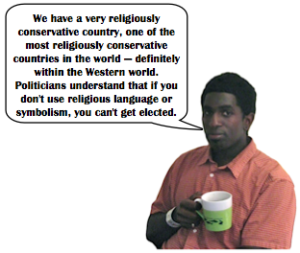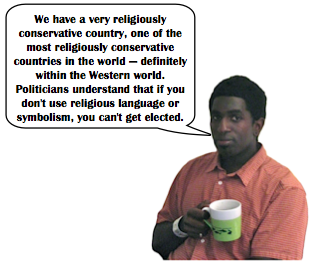Does God really want you to have a gun? How are things “supposed to be”?

We don’t hate God. Nor do we hate Protestants, Catholics, Orthodox Jews, Muslims, or even Mormons.
If God is the concept that gives a person direction in life, we’re not going to deny him or her that.
But we don’t get what God has got to do with the GOP primary race for president, or politics at all, for that matter.
Americans are in severe economic trouble. The unemployment rate is still much higher than it should be, monthly job creation rates are low, and foreclosure rates are sky-high.
But instead of focusing on the problems at hand, conservative politicians have shifted the country’s focus to a narrow-minded debate about religious ideas.
Unfortunately, the emphasis on religion has taken politics to a new low of pure unintelligence. When well-known political figures such as Newt Gingrich claim that every member of the human race should have a gun — because the ownership of a firearm is a right endowed by God — we know that our country is it trouble.
Vision, or viewpoint?
Religion has been a centerpiece of the GOP presidential primary. Perhaps more than any other candidate, Rick Santorum directly aligned his now-concluded campaign with his Catholic evangelical vision.
According to Santorum’s campaign website, the former Pennsylvania senator wants to “restore America’s greatness through the promotion of faith, family and freedom.” Santorum has also consistently fought legislation promoting abortion, contraception, and same-sex marriage.
“Many of the Christian faith have said, ‘well, that’s okay, contraception is okay.’ It’s not okay. It’s a license to do things in a sexual realm that is counter to how things are supposed to be,” Santorum has said.
So, how are things “supposed to be?” For Gingrich, things should align with the “Judeo-Christian foundations of the United States,” which he raised in response to the Ninth U.S. Circuit Court of Appeals ruling that California’s Proposition 8, banning same-sex marriage, is unconstitutional.
Similarly, former Massachusetts governor and likely GOP nominee Mitt Romney said, “I believe marriage is between a man and a woman and, as president, I will protect traditional marriage, and appoint judges who interpret the Constitution as it is written and not according to their own politics and prejudices.”
Thus, when Romney declares his own beliefs as the correct interpretation of the U.S. Constitution, we are expected to accept this as the indisputable truth. However, as he ironically asserts, U.S. federal judges are prejudiced and self-centered for acting on their beliefs.
Debate over marriage equality
On May 9, President Obama announced his support for same-sex marriage, the first time an American president has done so while occupying the Oval Office.
Predictably, the statement received massive amounts of backlash from both faith-based institutions and the Right.
“For the first time this election season, I thought I might send Mitt Romney a check,” the Rev. David Pinckney, a pastor of the evangelical River of Grace Church in Concord, N.H., told Masslive.com, a Massachusetts-based news outlet. “It’s not a civil rights issue, it’s a religious issue.”
Unfortunately for the pastor, marriage equality is a civil rights issue. The government is the entity that issues marriage licenses and our 14th Amendment states that all citizens must be treated equally under the law. Religious establishments cannot infringe on this right.
Church and state divide
There is a reason why our founders based this country on the principle of separation of church and state: Religion has no place in politics.
Although Santorum said, “The idea that the church should have no influence or no involvement in the operation of the state is absolutely antithetical of the objectives and vision of our country,” it is clear that his commitment to traditional religious principles hurt his campaign more than it helped.
A 2011 survey by the Pew Forum on Religion and Public Life found that “A strong majority of those who are affiliated with a religion, including majorities of nearly every religious tradition, do not believe their religion is the only way to salvation,” and that “relatively few Americans say they look to religion as the primary source of their views on social and political issues.”
While religion has a way of polarizing voters, the fact is that Americans appear to be equally divided on social issues such as same-sex marriage. Forty-six percent of Christians recognize the legitimacy of same-sex marriage, compared with 42 percent who do not.
Why, then, would Gingrich and Santorum make such extreme religious ideas such dominant fixtures of their campaigns?
Sunday voters
Maybe it’s because if there’s one place to find conservative voters these days, it’s in church.
According to the same survey, conservatives attend a religious service weekly or more often, while only 31 percent of moderates and 12 percent of liberals do so. Forty-six percent of conservatives consider religion very important, whereas 36 percent of liberals do not consider faith important at all.
“Conservatism is rooted in the concepts of personal responsibility, limited government, free markets, individual liberty, traditional American values and a strong national defense,” according to Conservatism.com, an online blog.
Let’s be clear: We have no problem with someone expressing this point of view. We would much rather discuss the pros and cons of a smaller government than debate the definition of marriage. But we’d note that stripping women of their right to choose, and prohibiting certain groups from getting married, both seem to be direct contradictions to many of the values that conservatives express.
What to debate now
Arguments over the legitimacy of birth control shouldn’t even exist this far into the 21st century — those debates were for the 60s and 70s. We need to start spending our valuable time on issues that will move us forward, not back.
Difficult as it may be to believe, God is not a presidential candidate, and He is not going to help us solve our political problems.
As Urban students, we are unbelievably lucky to go to a school that gives us the foundations, if not the solutions, that are necessary to fight social and economic injustices, from homophobia, to racism, to sexism, to income disparity. But we can’t simply make fun of those who invoke God to solve what’s broken. We need to act.
True, as Urban students living and going to school in San Francisco, there’s a tendency to live in a liberal bubble, with values that aren’t reflected by the majority of this country.
So be it. When you leave here, take the so-called “Urban bubble” with you. Use the privileges that this school affords you to make this country a better place for both our generation and those to come.
This editorial was written by the student below, and represents a consensus view of the Legend staff.


